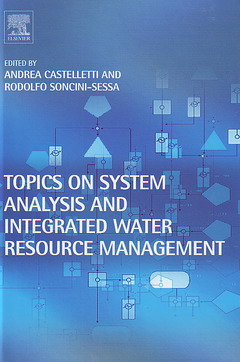Topics on System Analysis and Integrated Water Resources Management
Coordonnateurs : Castelletti Andrea, Soncini-Sessa Rodolfo

The Integrated Water Resources Management (IWRM) paradigm has been worldwide recognized as the only feasible way currently available to ensure a sustainable perspective in planning and managing water resource systems. It is the inspiring principle of the Water Framework Directive, adopted by the European Union in 2000, as well as the main reference for all the water related activity of UNESCO in the third world countries. However, very often, real world attempts of implementing IWRM fail for the lack of a systematic approach and the inadequacy of tools and techniques adopted to address the intrinsically complex nature of water systems. This book explores recent and important contributions of System Analysis and Control Theory to the technical application of such paradigm and to the improvement of its theoretical basis. Its prior aim is to demonstrate how the modelling and computational difficulties posed by this paradigm might be significantly reduced by strengthening the efficiency of the solution techniques, instead of weakening the integration requirements. The first introductory chapter provides the reader with a logical map of the book, by formalizing the IWRM paradigm in a nine-step decisional procedure and by identifying the points where the contribution of System Analysis and Control Theory is more useful. The book is then organized in three sections whose chapters analyze some theoretical and mathematical aspects of these contributions or presents design applications. The outstanding research issues on the border between System Analysis and IWRM is depicted in the last chapter, where a pull of scientists and experts, coordinated by Prof. Tony Jakeman describe the foreseeable scenario.
The book is based on the most outstanding contributions to the IFAC workshop on Modelling and Control for Participatory Planning and Managing Water Systems held in Venice, September 28- October 1, 2004. That workshop has been conceived and organized with the explicit purpose of producing this book: the maximum length of the papers was unusually long (of the size of a book chapter) and only five long oral presentations were planned each day, thus allowing for a very useful and constructive discussion.
Chapter 1. A Participatory and Integrated Planning Procedure for Decision Making in Water Resource Systems (A. Castelletti, R. Soncini Sessa).
I. Modelling
Chapter 2. The Data-Based Mechanistic Approach in Hydrological Modelling (P.C. Young et al.).
Chapter 3. Bayesian Networks as a Participatory Modelling Tool for Groundwater Protection (H.J. Henriksen et al.).
Chapter 4. Exploring Water Conservation Behaviour through Participatory Agent-Based Modelling (A. Rixon et al.).
II. Managing and MODSS
Chapter 5. Decision Support Systems for Integrated Water Resources Management with an Application to the Nile Basin (A.P. Georgakakos).
Chapter 6. Water Reservoirs Management under Uncertainty by Approximating Networks and Learning from Data (M. Baglietto et al.).
Chapter 7. Optimising Irrigation Management at the Plot Scale to Participate at the Regional Scale Water Resource Management (J-E. Bergez et al.).
Chapter 8. Multi-objective Optimization of Water Distribution System Design under Uncertain Demand and Pipe Roughness (A.V. Babayan et al.).
III. Planning and MODSS
Chapter 9. Sustainable Floodplain Management and Participatory Planning in the Red River Basin, Canada (S.P. Simonovic).
Chapter 10. Negotiation Support System for Resolution of Disputes Over International Water Resources (L. Kronaveter, U. Shamir).
Chapter 11. Workflow Oriented Participatory Decision Support for Integrated River Basin Planning (J. Dietrich et al.).
Chapter 12. Comprehensive Testing and Application of the PIP Procedure: The Verbano Project Case Study (A. Castelletti et al.).
Chapter 13. Social Science Contributions to the Participatory Planning of Water Systems - Results from Swiss Case Studies (B. Junker, M. Buchecker).
Chapter 14. Multi-Criterion Decision Making Approach to Assess the Performance of Reconstructed Watersheds (A. Elshorbagy et al.).
IV. Future Directions
Chapter 15. Outstanding Research Issues in Integration and Participation for Water Resource Planning and Management (A.J. Jakeman et al.).
Rodolfo Soncini-Sessa received his PhD on System Analysis at Politecnico di Milano, Italy in 1972; he was with the Water Group of the International Institute for System Analysis (IIASA) several times since 1975 and thought Water Management in some Italian Universities before being full professor of Natural Resources Management at the Politecnico di Milano. He is chair of the IFAC TC on Modelling & Control of Environmental Systems, and in the Editorial Boards of Water International and Journal of Environmental Modelling and Software. His main research interests are in the design of DSS for participatory decision making in the area of water resources.
- Contributions from the leading world specialists of the field
- Integration of technical modelling aspects and participatory decision-making
- Good compromise between theory and application
Date de parution : 10-2006
Ouvrage de 304 p.
Épuisé



